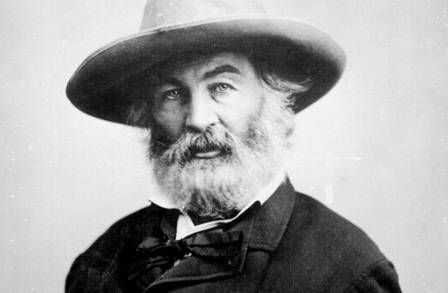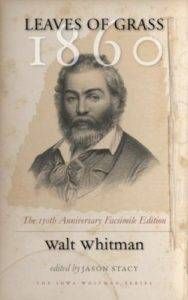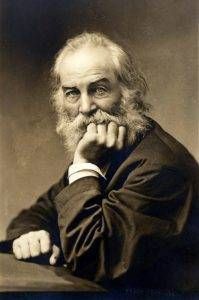
Reading LEAVES OF GRASS as a Self-Help Book

I had a real sh*t sandwich of a May and June. Like any type-A bookworm, I turned to books to fix it for me. Book Riot favorites Daring Greatly and Tiny Beautiful Things shared space on my bedside table with Radical Self Love and Year of Yes. In news that will not surprise you even a little bit, none of these books instantly fixed my sh*t. All four of them were interesting enough and gave me some things to think about but none felt like they spoke to my particular blend of emotional upheaval and unshakable political anxiety.
After these books failed to fix everything, I gave up and flounced away to read something “serious,” “literary,” and “difficult.” Because when you’re having a lot of feelings, literary fiction with difficult language is obviously the thing you need to read to prove your value or something. I don’t know, I was a mess. Anyway, after hearing a talk about Walt Whitman in Washington, I picked up Leaves of Grass. (Also, if I’m being honest, I was intrigued by the promise of classy-not-tawdry sexy book).
As it turns out, not only is Leaves of Grass a fantastic and important work of American literature, it’s full of really good life advice. Whitman may have written that, “You are also asking me questions, and I hear you,/ I answer that I cannot answer– you must find out for yourself.” And yet, he did give me something like an answer with his poetry. Or I found it there. Either way, Leaves of Grass gave me both comfort and some concrete next steps for dealing my personal sh*t sandwich.

Whitman also said that, “I think I will do nothing for a long time but listen,/ To accrue what I hear into myself– to let sounds contribute toward me.” Nearly everyone could benefit from a bit more listening but I am certainly guilty of thinking ahead to what I’m going to say or imagining and planning for possible future conversations. A bit more time listening and letting the sounds in my world create my inner life wouldn’t be such a bad idea.
Some parts of Leaves of Grass feel like they could have been written for today’s lefty activists. His absolute and unironic faith in America was refreshing (if naive) and helped me put my own political work in perspective. I especially appreciated the short poem “Walt Whitman’s Caution.” In it, he begs states and cities to “Resist much, obey little.” I’d like to believe that Whitman would totally be part of the #resistance and that he would totally encourage his readers to practice self-care.
Finally, if you need more proof that Leaves of Grass is kinda a self-help book, I’ll just point out that in “Song of Myself” Whitman wrote, “This then is life,/here is what has come to the surface after so many throes and convulsions.” Obviously this is the 19th century equivalent of Cheryl Strayed’s “the f*ck is your life. Answer it.” BOOM!














